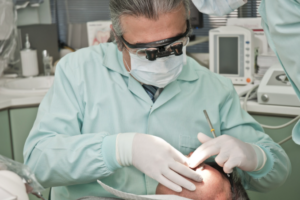Good oral health has evolved beyond just brushing your teeth twice a day and flossing. As people become more educated about their health, your dentist is also going to check more and more factors to see if everything is as it should be. One of the growing concerns of oral health is gum disease or periodontal disease.
What Is Gum Disease?
Gum disease or periodontal disease is a broad term for problems with your gums. At its earliest stages, it is gingivitis which can cause a buildup of plaque and germs that cause cavities or make your gums red.
If gum disease goes unchecked, it can quickly progress into worse stages which result in your gums receding from your teeth or becoming severely damaged. This damage can then lead to infection, tooth loss or other serious health concerns that go beyond your mouth.
How Do I Know If I Have Gum Disease?
One of the most common causes of gum disease is not flossing. While brushing your teeth is a great habit, flossing in between can help get plaque off your teeth which prevents the build up of more serious germs.
You can check for gum disease in its various stages by looking for the following symptoms:
- Receding gums
- Bleeding gums (ranging from light to serious)
- Bad breath that doesn’t go away with brushing
- Tooth sensitivity
- Redness and swelling
Is There a Way to Treat or Reverse Gum Disease?
As previously stated, gum disease comes in stages and treating or reversing it depends on the stage. Luckily, catching it early in the gingivitis stage is fully treatable and reversible. Going to a dentist for cleaning, flossing more and using mouthwash can help clean and prevent gingivitis from occurring.
Unfortunately, later stages of gum disease, especially when the gums have receded significantly, are not reversible. While your dentist can prevent further damage, there is no way to recover the lost gums. This is why it is absolutely critical to take care of your gums early and well.
How Can I Get Checked for Gum Disease?
The first step in preventing gum disease is going to your dentist for bi-annual checkups. These checkups can help clean up gingivitis and prevent gum disease from progressing. Additionally, if you’ve had problems in the past, your dentist can help you maintain your gums as they are and prevent further deterioration.
If you or your family are concerned about gingivitis and other issues with your oral health, contact us today at Hassey Dental. Our expert dentists and care teams can help you develop the right treatment plan for your oral health and your needs.




